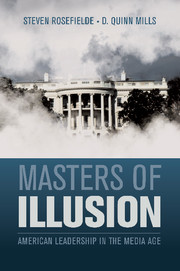Book contents
- Frontmatter
- Contents
- List of Tables and Figures
- Preface
- Acronyms
- Executive Summary
- Acknowledgments
- PART I NATIONAL SECURITY IN THE NEW AGE
- PART II AMERICAN PUBLIC CULTURE AND THE WORLD
- PART III AMERICAN PUBLIC CULTURE AND OURSELVES
- PART IV THE RECONFIGURATION OF NATIONAL WEALTH AND POWER
- PART V VORTEXES OF DANGER
- PART VI THE AMERICAN RESPONSE
- 13 Strategic Independence: An Ounce of Prevention
- 14 America as Mature Superpower
- PART VII LEADING TOWARD PEACE
- PART VIII AMERICAN PRESIDENTIAL LEADERSHIP
- Notes
- Glossary
- Bibliography
- Index
14 - America as Mature Superpower
Published online by Cambridge University Press: 31 July 2009
- Frontmatter
- Contents
- List of Tables and Figures
- Preface
- Acronyms
- Executive Summary
- Acknowledgments
- PART I NATIONAL SECURITY IN THE NEW AGE
- PART II AMERICAN PUBLIC CULTURE AND THE WORLD
- PART III AMERICAN PUBLIC CULTURE AND OURSELVES
- PART IV THE RECONFIGURATION OF NATIONAL WEALTH AND POWER
- PART V VORTEXES OF DANGER
- PART VI THE AMERICAN RESPONSE
- 13 Strategic Independence: An Ounce of Prevention
- 14 America as Mature Superpower
- PART VII LEADING TOWARD PEACE
- PART VIII AMERICAN PRESIDENTIAL LEADERSHIP
- Notes
- Glossary
- Bibliography
- Index
Summary
AMERICAN MILITARY EFFECTIVENESS
The major lesson for other countries from America's changed attitude toward its defense strategy, and specifically from the Second Gulf War and its aftermath is that the United States is able to defend itself effectively – it is no paper tiger. We have however developed an extremely effective military; one of which Americans are increasingly proud.
A few years ago, in the period between the two Iraqi wars, the Minister of Defense of a major European power at a dinner conversation commented on his meetings with the American military leadership and his assessment of their performance in Iraq in the early 1990s. “You'd be amazed at how good these Americans really are these days,” he said. “They're committed, hard-working, very professional. There's nothing else to match them in the world today. I'm just amazed. It's a totally different situation from the American military in the Vietnam War.”
He was right, and his judgment has been confirmed again in the second Iraqi War. That a significant outcome of the Iraq engagement was to demonstrate American military effectiveness is confirmed by the now revealed desire of the French military forces to participate in the invasion (although they were refused the opportunity by French political leaders for reasons that had much to do with the political rivalry between France/EC on one side and the United States on the other).
- Type
- Chapter
- Information
- Masters of IllusionAmerican Leadership in the Media Age, pp. 332 - 340Publisher: Cambridge University PressPrint publication year: 2006

